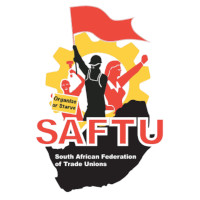The South African Federation of Trade Unions (SAFTU) are concerned by reports of abuse of journalists in Nkandla, where former president Jacob Zuma’s supporters have gathered to support him, anticipating his arrest this week following the Constitutional Court ruling that he was in contempt of court. Whether he goes to jail for this particular crime – and he faces prosecution for more sustained acts of corruption dating to the late-1990s Arms Deal – it is unlikely he would serve the 15 months in prison, as jail overcrowding is being reduced due to the Covid-19 pandemic.
The South African National Editors Forum (SANEF) has released a statement in which it correctly expresses deep outrage about what it refers to as the “brazen physical and verbal abuse of journalists by supporters” of Zuma.
Samkelo Maseko, one of the SABC’s leading political journalists, is the victim of what seems to be persistent abuse. On more than one occasion, Maseko was attacked by Zuma supporters at Nkandla. He was slapped, pushed, strangled and had insults hurled at him in these attacks.
SANEF further revealed in its statement that Zuma’s son Edward actually “threatened to burn one of the media’s vehicles” at the scene.
This intimidation aims to create an atmosphere of fear and self-censorship amongst journalists. The sharp, fearless reporting by some of these journalists has struck a nerve. The result is that supporters of Zuma, who are clearly trying to push a narrative of victimhood, cannot respond rationally. They obviously despise the truth.
Such acts go against the spirit of our constitutional democracy, in which the freedom of expression, and the rights of the press and media to report to the society are enshrined as some of the Constitution’s most important pillars. To that effect, a Press Council has been established, and gives expression to the Constitutional mandates that allow journalists to report news freely, without intimidation.
Still, if there is bias in the media, it must be called out. If journalists allow themselves to be influenced by commercial, political, personal and other non-professional considerations, they should be made accountable for what they report. But such accountability would not be pursued so as to realign journalists to report in anyone’s favour. What we would never support is the narrative being promoted by Zuma, which is to lump accurate coverage of his shenanigans as a concerted plan to vilify him. This should be called out for what it is: a desire to intimidate journalists from pursuing stories that are unsettling to him.
We stand by journalists who are not intimidated by the diatribes Zuma and his close supporters launch against them, and who continue to expose the baseness of his attacks, as they did last night when sharply raising questions which he evaded by trying to mock the journalists.
SAFTU call on law enforcement agencies to ensure journalists are protected in their quest to scrutinise those with power who shape society. Our freedom is not only a product of Jacob Zuma’s sacrifices or those of other African National Congress members. Instead, we are free in part because of journalists, along with the whole gamut of activists, musicians, poets, the international community, and grassroots working-class organisations who played a decisive role against the murderous National Party regime.
The arrogance that Zuma has always expressed, in attempting to take credit for freedom in South Africa – as a ploy to avoid the responsibilities he once held as a popular leader – no longer works. We are not fooled – and one reason is the fact that journalists have helped to probe the lies and corruption, and must continue unhindered.






